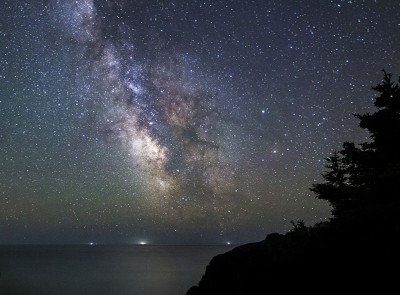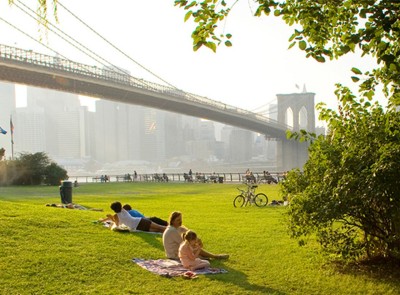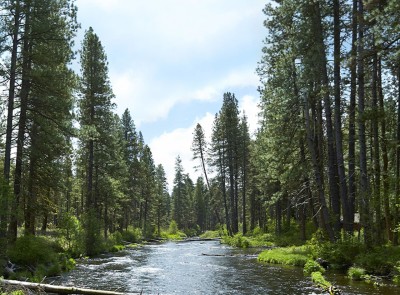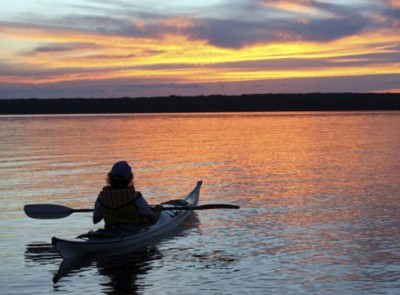Freeport, ME, December 20, 2021
Introducing Our Research Partner, Paul Piff
Announcing an exciting new partnership on the study of awe in the outdoors
L.L.Bean’s purpose is to inspire and enable people to experience the restorative power of being outside. This is something we all feel to be true—our founder Leon Leonwood Bean expressed this sentiment 100 years ago—but it’s hard to explain why it’s true. Why does time outdoors make us feel so much better? One reason we find nature so beneficial for psychological health is that it arouses awe – the emotional response to being in the presence of something vast and powerful that it transcends our understanding of the world.
In August of 2020, we embarked on a journey to find the right partner to help explain what’s at the core of that restorative power. We knew that if we could better understand the why, we could motivate more people to seek the experience – and do a better job of fulfilling our purpose.
We met Dr. Paul Piff, associate professor of psychology at UC Irvine, and knew he’d be a great fit right away. He studies the positive effects of time in the outdoors on the human condition and we are partnering with him to uncover more answers.
Dr. Paul Piff
As we embark on this journey together, we asked Dr. Piff a few questions to get to know him better and explore what he’s hoping to learn through this research.
Why are you excited about kicking off this research?
We are researching the restorative powers of experiencing awe in the outdoors. And the questions we’re exploring, with the generous support of L.L.Bean, have never been scientifically tested and have important implications for people and society. We think awe is among one of the most meaningful and transformative experiences, yet science has little to say about the role it plays in our lives. We’re especially interested in whether experiences of awe in nature are beneficial for people because it connects them to one another socially. Our preliminary findings reveal that experiences of awe have a socially binding function – they allow people to forge closer and more meaningful connections. We will examine whether experiences of awe outdoors, especially when shared with others, are among the most restorative and memorable experiences people can have, increasing happiness, reducing stress, and, we think, enhancing empathy and compassion toward others in society at large.
Why is this research especially relevant/important now?
Because of the ongoing pandemic, people are living in almost unprecedented times of social hardship – our ability to spend time with and connect with others is drastically curbed and, as a society, we are experiencing tremendous social deprivation. At the same time, outdoor experiences emerged as one of the safest ways to spend time with others. We’re interested in the benefits of these experiences, the role they play in enhancing well-being and happiness, reducing stress, and allowing people to better cope with the pandemic. Can experiences of awe in nature allow people to not only survive but also thrive during the pandemic? More generally, the question of what connects people to others, shifting individuals from focusing on “me” to focusing on “we,” is of huge societal importance. Many of the most pressing problems of the day, whether it’s the pandemic, climate change, or economic hardship, rely on people working together to arrive at collective solutions. We think that experiences of awe play a central role, by connecting people to one another and the larger entities (like society) they are part of. As a result, we think experiences of awe might increase social connection and allow people to be better able to come together as cohesive groups to devise solutions to the threatening problems they face.
Do you have any hypotheses about what you might uncover?
We think experiences of awe outdoors will be among the most meaningful, socially connecting, and memorable experiences people can have. We think that shared experiences of awe – that is, when you have an experience that involves the emotion of awe with someone else or a group – will be particularly beneficial for health and well-being. Moreover, we think such experiences help bind people together, deepening friendship, and even increasing empathy across various social divisions in society.
Personal anecdote about experiencing awe in the outdoors?
I’ve always loved the water and swimming. Growing up in Israel, my family would take us to a local spring-fed swimming hole on the weekends. It was my favorite place as a kid. I remember swimming to the bottom of the spring, sitting on the bottom as best I could while holding my breath, and staring up at the surface of the water from beneath, totally in awe of the cascading, rippling patterns of light on water. Nowadays, I look for ways to build awe into every experience I have. Whether it’s a hike outside with my wife and baby boy, a run on the beach, a walk around the neighborhood, or a picnic in a park with friends––awe is easy to find if you know to look for it.
Related Stories





